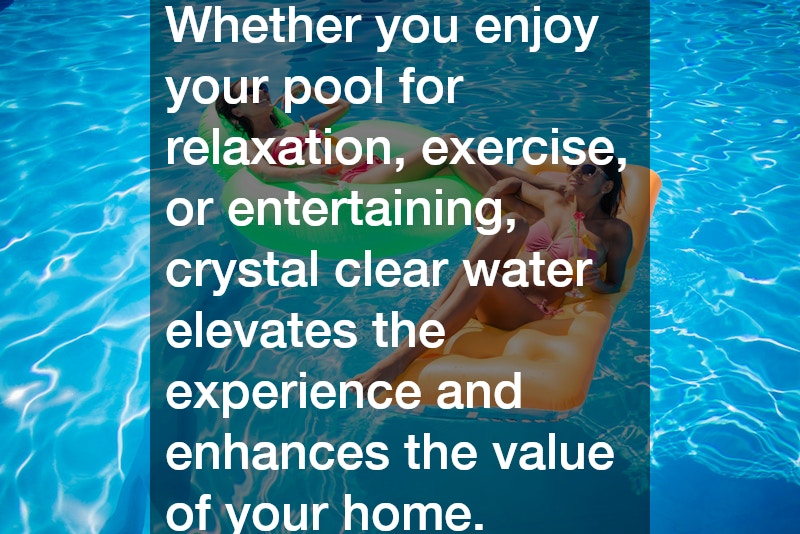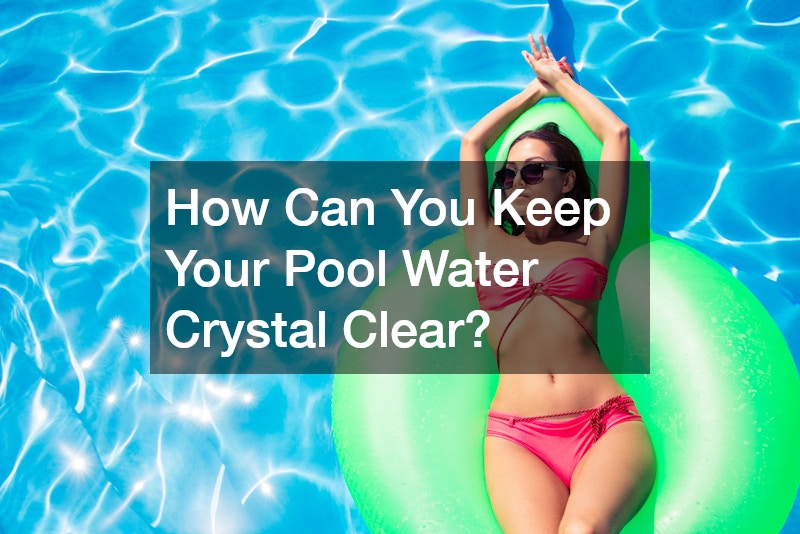Having a sparkling, crystal clear pool is the dream of many homeowners, especially as the warmer months approach. Pools not only provide a refreshing escape from the heat but also serve as a beautiful focal point for outdoor living areas. However, maintaining pristine water quality requires regular attention and the right care routine.
This article explores how you can keep your pool water crystal clear, ensuring it remains inviting and safe for swimmers all year round.
Understanding the Importance of Clear Pool Water
Clear pool water is more than just an aesthetic goal. It indicates balanced water chemistry, proper filtration and effective sanitisation. Cloudy or murky water can signal the presence of contaminants, algae growth, or chemical imbalances, which can pose health risks to swimmers. Pools that are not properly maintained may harbour harmful bacteria and irritants, leading to skin and eye discomfort, or even infections.
Regular maintenance of pools ensures the water is safe to swim in, extends the lifespan of pool equipment and reduces the need for costly repairs. Clear water also allows you to see the pool’s bottom easily, making it safer for all users. With these benefits in mind, let’s delve into the practical steps you can take to achieve crystal clear pool water.
Regular Testing and Balancing of Water Chemistry
One of the most critical aspects of pool care is maintaining balanced water chemistry. The primary elements to monitor are pH, chlorine levels, alkalinity and calcium hardness. The pH level should ideally be between 7.2 and 7.8, which is slightly alkaline and comfortable for swimmers. If the pH is too low, the water becomes acidic and can cause corrosion of pool surfaces and irritation to the skin and eyes. If it is too high, the water may become cloudy and scale can form on pool equipment.
Chlorine is the most common sanitizer used in pools and should be kept within a safe range of 1 to 3 parts per million (ppm). It helps to kill bacteria and algae, keeping the water clean and safe. Over-chlorinating can cause a strong smell and irritation, so it’s essential to maintain balanced levels. Alkalinity, which acts as a buffer for pH, should be maintained between 80 and 120 ppm. Proper calcium hardness prevents corrosion and protects the pool surfaces from damage.
Test your pool water at least twice a week using a reliable pool testing kit. This practice helps you stay ahead of any chemical imbalances before they cause problems such as cloudy water or algae blooms.
Effective Filtration and Circulation
Filtration is the backbone of maintaining crystal clear pools. The pool’s filtration system removes debris, dirt and microscopic particles that cloud the water. A well-maintained filter works around the clock to trap contaminants, allowing water to circulate cleanly.
Make sure to run your pool pump and filtration system for at least 8 to 12 hours daily, depending on the pool size and usage. This constant circulation prevents stagnation, which can lead to algae growth and water quality issues. Backwash or clean your filter regularly according to the manufacturer’s instructions. A dirty filter reduces water flow and hampers its ability to keep the pool water clean.
Skimming the surface daily removes leaves, insects and other floating debris before they sink and decompose. Additionally, brushing the pool walls and floor once a week helps prevent algae from establishing itself on surfaces. Together, these practices keep pools sparkling and clear.
Preventing and Treating Algae Growth
Algae are one of the most common culprits behind cloudy and greenish pool water. These tiny aquatic plants thrive in warm, stagnant water with poor chemical balance. Preventing algae growth is essential to maintaining crystal clear pools.
Regular use of algaecide treatments can help prevent algae spores from taking hold. It is especially important to apply these treatments after heavy rain, hot weather, or when pool usage is high. If algae do appear, shock treatment is the fastest way to eradicate it. Shock treatment involves adding a large dose of chlorine or other sanitiser to quickly kill algae and organic contaminants. Follow the instructions carefully to avoid damaging your pool or irritating swimmers.
Maintaining Proper Water Levels and Cleaning Equipment
Keeping the pool water at the correct level is also important for clarity. Water that is too low can damage the pump, while water that is too high may affect skimmer efficiency. Monitor and adjust water levels regularly, especially after heavy rain or evaporation during hot days.
Clean your pool equipment regularly to avoid the buildup of dirt and contaminants. Skimmer baskets, pump baskets and filters need attention to ensure they function optimally. Neglecting equipment maintenance can reduce the overall effectiveness of your pool system and lead to water clarity issues.
Keeping your pool water crystal clear requires a combination of consistent chemical balancing, effective filtration, regular cleaning and preventative treatments. Understanding the importance of these steps helps pool owners create a healthy and inviting environment for swimmers. Pools that are well maintained not only look fantastic but also provide peace of mind knowing they are safe and hygienic.
By testing water regularly, maintaining proper filtration and circulation, preventing algae growth and caring for equipment, you ensure your pool remains a shimmering oasis all year round. Whether you enjoy your pool for relaxation, exercise, or entertaining, crystal clear water elevates the experience and enhances the value of your home.

